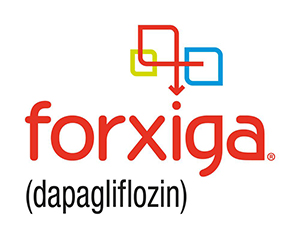
9. Drug Updates |

![]() A study recently published in the journal Diabetes Care evaluated the long-term safety and efficacy of dapagliflozin as an adjunct to adjustable insulin in patients with T1DM and inadequate glycemic control.
Dapagliflozin is a sodium-glucose cotransporter 2 inhibitor, which prevents glucose reabsorption in the kidney. The drug is indicated as an adjunct to diet and exercise to improve glycemic control in adults with T2DM. But it is not yet recommended for patients with T1DM or for the treatment of diabetic ketoacidosis.
A study recently published in the journal Diabetes Care evaluated the long-term safety and efficacy of dapagliflozin as an adjunct to adjustable insulin in patients with T1DM and inadequate glycemic control.
Dapagliflozin is a sodium-glucose cotransporter 2 inhibitor, which prevents glucose reabsorption in the kidney. The drug is indicated as an adjunct to diet and exercise to improve glycemic control in adults with T2DM. But it is not yet recommended for patients with T1DM or for the treatment of diabetic ketoacidosis.
![]() Present study evaluated the 52-week data (24-week short-term and 28-week extension period) from double-blind, placebo-controlled phase 3 DEPICT-1 (Dapagliflozin Evaluation in Patients With Inadequately Controlled Type 1 Diabetes) study. DEPICT-1 was a randomized (1:1:1), double-blind, placebo-controlled Phase 3 study of dapagliflozin 5 mg and 10 mg in patients with T1DM (HbA1c, 7.5–10.5% [58–91 mmol/mol]).
Present study evaluated the 52-week data (24-week short-term and 28-week extension period) from double-blind, placebo-controlled phase 3 DEPICT-1 (Dapagliflozin Evaluation in Patients With Inadequately Controlled Type 1 Diabetes) study. DEPICT-1 was a randomized (1:1:1), double-blind, placebo-controlled Phase 3 study of dapagliflozin 5 mg and 10 mg in patients with T1DM (HbA1c, 7.5–10.5% [58–91 mmol/mol]).
![]() 708 individuals completed the 52-week study and over 52 weeks, when compared with placebo, individuals in the dapagliflozin 5 mg and 10 mg groups showed significant reductions in: HbA1c (mean difference [MD], −0.33% (95% CI, −0.49% to −0.17%) and −0.36% (95% CI, −0.53% to −0.20%), respectively) and body weight (MD, −2.95% [95% CI, −3.83% to −2.06%] and −4.54% [95% CI, −5.40% to −3.66%], respectively).
708 individuals completed the 52-week study and over 52 weeks, when compared with placebo, individuals in the dapagliflozin 5 mg and 10 mg groups showed significant reductions in: HbA1c (mean difference [MD], −0.33% (95% CI, −0.49% to −0.17%) and −0.36% (95% CI, −0.53% to −0.20%), respectively) and body weight (MD, −2.95% [95% CI, −3.83% to −2.06%] and −4.54% [95% CI, −5.40% to −3.66%], respectively).
![]() Serious adverse events were experienced by 13.4%, 13.5% and 11.5% of the individuals in the dapagliflozin 5 mg, 10 mg and placebo groups, respectively. Hypoglycemia events were comparable across treatment groups. However, more dapagliflozin treated individuals had events adjudicated as definite diabetic ketoacidosis (DKA; 4.0%, 3.4%, and 1.9% in dapagliflozin 5 mg, 10 mg, and placebo groups, respectively).
Serious adverse events were experienced by 13.4%, 13.5% and 11.5% of the individuals in the dapagliflozin 5 mg, 10 mg and placebo groups, respectively. Hypoglycemia events were comparable across treatment groups. However, more dapagliflozin treated individuals had events adjudicated as definite diabetic ketoacidosis (DKA; 4.0%, 3.4%, and 1.9% in dapagliflozin 5 mg, 10 mg, and placebo groups, respectively).
![]() Adjunct dapagliflozin for 52 weeks led to improvements in glycemic control and body weight in individuals with inadequately controlled T1DM, while increasing the risk of DKA.
Adjunct dapagliflozin for 52 weeks led to improvements in glycemic control and body weight in individuals with inadequately controlled T1DM, while increasing the risk of DKA.

![]() Comorbidities and complications associated with T2DM increase with age, making treatment of elderly persons with this condition challenging. Glucagon-like peptide-1 agonists are among the newer classes of antihyperglycemic agents recommended to treat T2DM.
Comorbidities and complications associated with T2DM increase with age, making treatment of elderly persons with this condition challenging. Glucagon-like peptide-1 agonists are among the newer classes of antihyperglycemic agents recommended to treat T2DM.
![]() In the the LEADER (Liraglutide Effect and Action in Diabetes: Evaluation of Cardiovascular Outcome Results) trial, a 13% reduction in major adverse cardiovascular events (MACEs) with liraglutide versus placebo in patients with T2DM at high risk for CV events had been reported. This study was a post hoc analysis of the LEADER trial, focused on elderly patients at high risk for CV events, and compared 836 individuals aged ≥75 years, 6183 aged 60-74 years, and 2321 aged <60 years.
In the the LEADER (Liraglutide Effect and Action in Diabetes: Evaluation of Cardiovascular Outcome Results) trial, a 13% reduction in major adverse cardiovascular events (MACEs) with liraglutide versus placebo in patients with T2DM at high risk for CV events had been reported. This study was a post hoc analysis of the LEADER trial, focused on elderly patients at high risk for CV events, and compared 836 individuals aged ≥75 years, 6183 aged 60-74 years, and 2321 aged <60 years.
![]() MACEs occurred more frequently in individuals aged ≥75 years than those aged 60-74 years, regardless of the treatment. HRs for primary composite major adverse CV events (CV death, nonfatal myocardial infarction, or nonfatal stroke) for liraglutide vs placebo were as follows- age <60 years: 0.77 (P=0.026); age 60-74 years: 0.95 (P=0.47); and age ≥75 years: 0.66 (P=0.006; P interaction=0.054). For all-cause death, HRs were- age <60 years: 0.71 (P=0.035); age 60-74 years: 0.94 (P=0.47); and age ≥75 years: 0.65 (P=.012; P interaction=0.088). Serious and nonserious medical events, respectively, were reported by 63.5% and 61.7% of patients aged ≥75 years vs. 49.5% and 49.8% among ages 60-74 years, with no difference by treatment group.
MACEs occurred more frequently in individuals aged ≥75 years than those aged 60-74 years, regardless of the treatment. HRs for primary composite major adverse CV events (CV death, nonfatal myocardial infarction, or nonfatal stroke) for liraglutide vs placebo were as follows- age <60 years: 0.77 (P=0.026); age 60-74 years: 0.95 (P=0.47); and age ≥75 years: 0.66 (P=0.006; P interaction=0.054). For all-cause death, HRs were- age <60 years: 0.71 (P=0.035); age 60-74 years: 0.94 (P=0.47); and age ≥75 years: 0.65 (P=.012; P interaction=0.088). Serious and nonserious medical events, respectively, were reported by 63.5% and 61.7% of patients aged ≥75 years vs. 49.5% and 49.8% among ages 60-74 years, with no difference by treatment group.
![]() The most common adverse events were neoplasms (10.3% vs. 14.2% in patients aged 60-74 years and ≥75 years, respectively) and gastrointestinal disorders (diarrhea, nausea, and vomiting in 1.2%, 2.4%, and 1.1% of patients aged 60-74 years and 2.8%, 2.9%, and 1.2% in those aged ≥75 years, respectively). In the liraglutide group versus the placebo group, more patients had gastrointestinal disorders (46.6% vs. 33.0%, respectively), regardless of age subgroup.
The most common adverse events were neoplasms (10.3% vs. 14.2% in patients aged 60-74 years and ≥75 years, respectively) and gastrointestinal disorders (diarrhea, nausea, and vomiting in 1.2%, 2.4%, and 1.1% of patients aged 60-74 years and 2.8%, 2.9%, and 1.2% in those aged ≥75 years, respectively). In the liraglutide group versus the placebo group, more patients had gastrointestinal disorders (46.6% vs. 33.0%, respectively), regardless of age subgroup.
![]() This post hoc analysis of the LEADER trial that focused on elderly patients at high risk for CV events, showed that liraglutide significantly reduced the risk for MACEs, expanded MACE outcomes, and all-cause death in this population compared with placebo. Benefits were found to be more pronounced in patients aged ≥75 years than in those aged 60-74 years.
This post hoc analysis of the LEADER trial that focused on elderly patients at high risk for CV events, showed that liraglutide significantly reduced the risk for MACEs, expanded MACE outcomes, and all-cause death in this population compared with placebo. Benefits were found to be more pronounced in patients aged ≥75 years than in those aged 60-74 years.
For enquiries info@jothydev.net.
Please visit: jothydev.net | research.jothydev.com | diabscreenkerala.net | jothydev.com/newsletter
